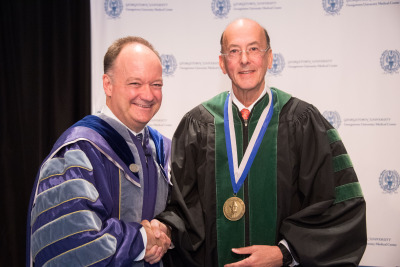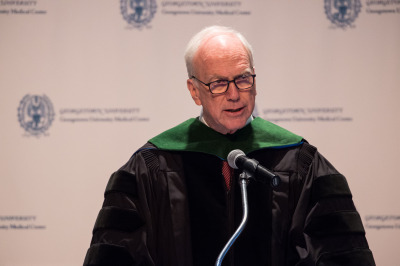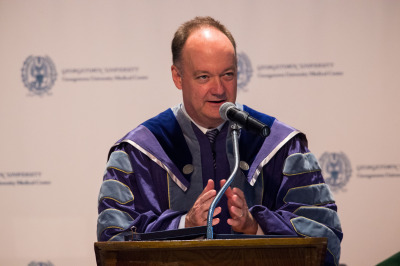Ninth Annual GUMC Convocation Celebrates Faculty, Students and a Global Health Expert

Posted in GUMC Stories
November 21, 2016 – Faculty members, students and staff gathered to celebrate the accomplishments of the Georgetown University Medical Center community at the Ninth Annual GUMC Convocation.
Focused on the topic of global health, the November 17 convocation featured a keynote address by the recipient of the 2016 Cura Personalis Award, Roger I. Glass, MD, PhD, director of the Fogarty International Center and associate director of research for the National Institutes of Health.
 “Through his long and multidimensional career and leadership in service to the goal of improving the health of all of the world’s citizens, Dr. Glass is a wonderful embodiment of our founding principle, cura personalis,” said Edward B. Healton, MD, MPH, executive vice president for health sciences and executive dean of the School of Medicine.
“Through his long and multidimensional career and leadership in service to the goal of improving the health of all of the world’s citizens, Dr. Glass is a wonderful embodiment of our founding principle, cura personalis,” said Edward B. Healton, MD, MPH, executive vice president for health sciences and executive dean of the School of Medicine.
Announcing the Launch of a New Global Health Initiative
During the GUMC community engagement process being led by Healton, global health emerged as one of the medical center’s main priorities. “The establishment of global health as a priority for the medical center recognizes our collective strengths, and at the same time sets out our aspirational goals to deepen the scholarship and impact of our work and to expand our engagement with the broader university and our global partners,” Healton said.
 At the convocation, Georgetown University President John DeGioia, PhD, announced a new global health initiative, expected to launch this January. “Our work in the time ahead will deepen our commitment to global health, through a global health initiative—led by Dr. Healton and Tom Banchoff, our vice president for global engagement—which will engage faculty and students across our Georgetown community,” DeGioia said.
At the convocation, Georgetown University President John DeGioia, PhD, announced a new global health initiative, expected to launch this January. “Our work in the time ahead will deepen our commitment to global health, through a global health initiative—led by Dr. Healton and Tom Banchoff, our vice president for global engagement—which will engage faculty and students across our Georgetown community,” DeGioia said.
**Read Dr. DeGioia’s Facebook post about the GUMC Convocation
Glass congratulated the university on making a commitment to advance global health and offered advice for the nascent initiative. “Pick a few global sites to work with, people you can support, opportunities to develop,” he said. “Engage the whole of Georgetown University. The future of the 21st century will be global. Ultimately, the winners of this endeavor will be the future students and faculty at Georgetown and the institution itself, along with your foreign partners.”
Members of the GUMC community were honored at convocation for their achievements in research, service and teaching. One of the honorees, Victoria Jennings, PhD, director of the Institute for Reproductive Health, was recognized for her lifetime contribution to GUMC.
**Read the complete list of award winners from the Ninth Annual GUMC Convocation.
During the convocation ceremony, members of the GUMC community who passed away within the last year were recognized during a short video remembrance.
A Career Inspired by Wanderlust
After members of the GUMC community were recognized for their achievements, Healton introduced Glass, who gave a keynote address that explained how he came to work in global health as well as suggestions for those interested in global health careers.

Inspired by wanderlust, a spirit of adventure and discovery and an openness to new ideas and new people, Glass pursued opportunities to travel in college and medical school, taking him to France, Russia, Argentina, Brazil, Peru, China, Colombia and England.
“Each experience opened my eyes to the world of medicine and introduced me to patients I might never see in my normal training or practice,” Glass said. “Getting out into the community made me realize that unless one sampled the patients and their homes, their culture, you could not anticipate what to expect, or provide care in a setting that was appropriate.”
The turning point in Glass’s career came when he was offered the opportunity to conduct a clinical trial for a new cholera vaccine in Bangladesh, where he learned that most severe cases of diarrhea were caused not by cholera but by rotavirus. After 600,000 children were vaccinated, some developed an intestinal obstruction that required surgery. The vaccination program was halted.
“The lesson here – everyone confronts failure,” Glass said. “It’s part of life so accept it, learn from it and move on. It’s the getting up that counts.”
Moving Forward From Failure
In 1998, the first rotavirus vaccine was launched in the US. Seven years later, two vaccines were licensed for use in the US, nearly eliminating rotavirus infections nationally. The vaccines were also licensed and recommended by the WHO for the immunization of children worldwide.
Glass then turned his attention towards working with an Indian pediatrician and entrepreneur, as well as several partners and funders, to develop a rotavirus vaccine that would cost just $1.
“The most exciting day of my life was when we unblinded the code from the clinical trial—and found the vaccine to be safe and effective,” Glass said. Soon after his election, Indian prime minister Narendra Modi said that all Indian children will receive the vaccine, the first totally new vaccine made in India in 100 years. The vaccine is currently being distributed in four states in India and will soon be available globally.
“If we want to continue to improve the lives of us all, we need to work together to accelerate research and discovery leading to cures and prevention strategies,” Glass said. “We also need to learn how to implement the discoveries that we have made – in the delivery of drugs, vaccines, effective treatments.”
Lessons Learned From a Career in Global Health
Students, recent graduates and interested staff should all be encouraged to pursue international experiences, Glass said. “Expose them to people in different cultures and worldviews,” he said. “They will come back with new insights and sensitivities.”
“Pick an important problem, be passionate in its pursuit, be tenacious in seeking answers and patient in achieving results,” Glass said. “Partnerships and friendships are key to success.”
Kat Zambon
GUMC Communications
